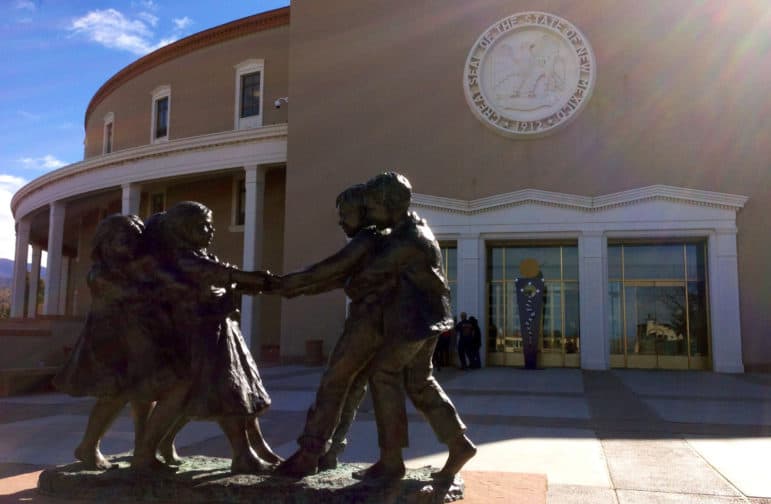
Heath Haussamen / NMPolitics.net
A statue outside the Roundhouse in Santa Fe.
After six years of trying to require “dark money” organizations and other independent-expenditure groups to report their political backers, supporters of campaign-finance reform got their bill through the state House of Representatives on Monday night.
The House on Monday passed Senate Bill 96, sponsored by Senate Majority Leader Peter Wirth, D-Santa Fe, and Rep. Jim Smith, D-Sandia Park. The bipartisan vote was 41 to 24. Six Republicans joined with the 35 Democrats to vote for the bill.
The Senate had already passed the bill, but it will have to go back there for consideration of House amendments. If the Senate doesn’t oppose any of the changes, it will go to Gov. Susana Martinez for signature. She has signaled some interest in the bill.
“This is huge,” said Viki Harrison, executive director of Common Cause New Mexico, which for years has been the major group pushing the issue. “The citizens of New Mexico support this. Our poll found 91 percent support this.”
Harrison said she doubts the Senate will have any trouble with the House amendments — mostly technical changes. She noted that Wirth was in the House chamber during the vote and he had no problem with the amendments.
Wirth has sponsored similar legislation each year since 2011. Normally, his bills passed the Senate by wide bipartisan margins but died quietly in the House.
Monday was the first time such a bill had reached the House floor.
The legislation was spurred in large part by the U.S. Supreme Court’s 2010 Citizens United decision, which freed corporations, unions, some nonprofits and others to raise and spend as much as they want on elections as long as they don’t coordinate with candidates.
The decision set off a sharp jump in election spending by so-called dark money groups. Those are tax-exempt groups that, unlike political action committees, don’t have to disclose their donors with state or federal election officials.
The bill would require any independent-expenditure group — such as a corporation, union or dark money group — that spends more than $1,000 campaigning during an election cycle to report expenditures and provide information about certain contributors. Any such group that coordinates with a candidate would be subject to contribution limits.
In addition to requiring more disclosure about donors, the bill also would double the amount of money that individuals can donate to some candidates for public office, which currently is $5,000 per election for legislative seats. The $10,000 cap on donations from political action committees to individuals would remain in place. The limit for contributions to candidates for statewide office, such as governor or attorney general, each election season would fall to $10,000 from $11,000.
Rep. Dennis Roch, R-Logan, said he supports the current law that requires disclosing the names of campaign contributors to candidates. But he said those who support groups advocating for or against ballot measures shouldn’t have their names disclosed. While candidates can do favors for contributors, Roch said, “Ballot measures can’t do favors for contributors.”
Smith countered that people have the right to know who is running ads for or against such measures.
Roch said the danger was “weaponizing” such information and using the information against people who donate. He used the example of Mozilla executive Brendan Eich, who donated $1,000 in 2008 to a group in favor of banning same-sex marriage in California. In 2014, that contribution came back to haunt him, and Eich resigned as chief executive officer of Mozilla.
Rep. Paul Bandy, R-Farmington, argued that even if the bill passes, independent expenditure groups will find a way around it — and the Legislature will try to fix loopholes in the future.
Contact Steve Terrell at (505) 986-3037 or sterrell@sfnewmexican.com. Read his political blog at santafenewmexican.com/